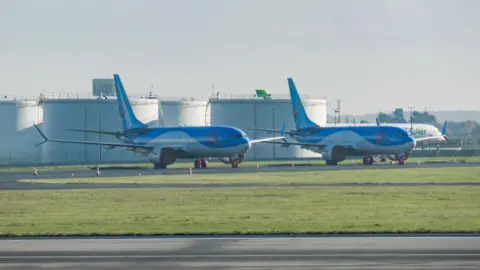Boeing delays 737 Max return date to July
 Getty Images
Getty ImagesBoeing has said it does not expect its 737 Max plane to return to the skies before the summer, which is longer than initially expected.
The jet has been grounded since March after two fatal crashes, which together killed 346 people.
Boeing has been working on fixes to try to get the 737 Max planes back up and running.
But the company has struggled to convince regulators that the planes are safe to fly.
It previously said it expected the planes to be cleared for approval before the end of 2019. But in December, Boeing announced plans to halt production of the aircraft and last week, it confirmed it had found a new problem in the software.
'Number one priority'
Boeing shares dropped by more than 5% on Tuesday as word of the delay started to spread, prompting the New York Stock Exchange to temporarily halt trading until the company's formal update.
Boeing said its new guidance for "mid-2020" was "informed by our experience to date with the certification process".
"Returning the Max safely to service is our number one priority, and we are confident that will happen."
The grounding has already cost Boeing more than $9bn, and the consequences are starting to spread, with at least one major supplier announcing layoffs. Several airlines dependent on the Max had already said they were not counting on the plane until the summer.


This is a major admission from Boeing, and one that reflects the new realism of the company under David Calhoun - just over a week into his tenure as chief executive.
Getting the 737 Max back in the air remains a priority - but Boeing is not in control of the situation.
The plane can only fly again once regulators in the US and elsewhere are satisfied it is wholly safe.
And the FAA, burned by the criticism it has faced over its relationship with Boeing, is re-examining the aircraft's design in minute detail.
While the flaw that triggered the two accidents involving the plane has been addressed, other issues have been found, and delays have mounted up.
Yet under ex-chief executive Dennis Muilenburg, Boeing repeatedly insisted the plane would fly again before the end of 2019.
That didn't happen - and such bold statements merely undermined the relationship between the manufacturer and the FAA.
Now, the company is acknowledging the process is likely to take a lot longer - not only due to problems it is already aware of, but also because of "further developments that may arise" during the certification process.
It's an admission that comes less than two weeks after Boeing released a trove of damaging internal messages. These tended to reinforce the impression of a company whose corporate culture had become deeply dysfunctional.
It certainly looks as though David Calhoun wants to get all the damaging information out there as soon as possible.
He can then present his own regime as a fresh start - and focus on getting the 737 Max back in the air, without the time pressures that hamstrung his predecessor.

This is the first update on the 737 since new chief executive David Calhoun started last week, and one week before he faces investors when Boeing publishes its quarterly results.
Boeing has been under intense scrutiny since two 737 Max planes crashed within five months of each other, first in Indonesia and then in Ethiopia.
Air safety officials investigating the tragedies have identified an automated control system in the plane, known as MCAS, as a factor in both crashes.
Boeing has said the MCAS software system, which relied on a single sensor, received erroneous data, which led it to override pilot commands and push the aircraft downwards.
It has said it is fixing the software and has overhauled its review procedures.
But US lawmakers, who are investigating the company, have said the firm was aware that the software system could be unreliable. They have accused the company of trying to hide the risks and rush the plane back into service, while criticising the US regulator - the Federal Aviation Administration - for failing in its duty of oversight.
The 737 Max is Boeing's fastest selling aircraft. An updated version of the company's short- and medium-haul workhorse, it was designed to be more fuel efficient than its predecessors.

- 29 October 2018: A 737 Max 8 operated by Lion Air crashes after leaving Indonesia, killing all 189 people on board
- 31 January 2019: Boeing reports an order of 5,011 Max planes from 79 customers
- 10 March 2019: A 737 Max 8 operated by Ethiopian Airlines crashes, killing all 157 people on board
- 14 March 2019: Boeing grounds entire 737 Max aircraft fleet

